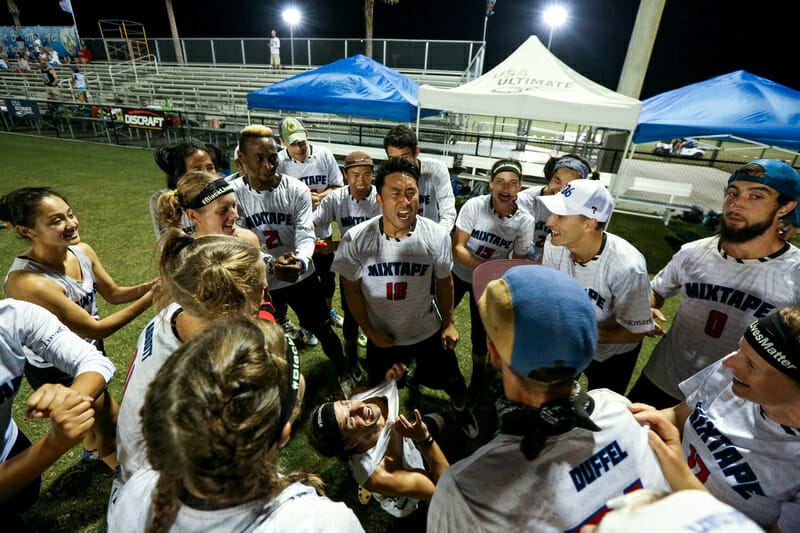October 22, 2017 by Colin Clauset in Analysis, Coverage with 0 comments

Ultiworld’s coverage of the Mixed Division at the 2017 Club Championships is presented by Tokay Ultimate; all opinions are those of the authors. Please support the brands that make Ultiworld possible and shop at Tokay Ultimate!
SARASOTA—Seattle Mixtape locked up another appearance in the Mixed Division title match with a 15-11 victory over Boston Slow White. While they had several trademark displays of athleticism, their emphasis on forcing Slow White to adjust to their game—especially around the end zone—pushed them past Boston’s tight person defense and into the final.
Mixtape has long been the most athletic team in the mixed division and their enduring love for mini, goaltimate, and the small-ball style of play has stayed part of the team culture since its inception. Mixtape used that style to attack Slow White’s goalline defense, using their comfort in tight spaces to take advantage of Slow White’s taller, but less agile defenders.
Slow White played a conservative defensive style, opting for tight person defense against Seattle’s speedy cutters to try to deny the deep space. Boston defenders stayed home on their matchups, rarely switching. This reliance on winning individual matchups opened the door for Mixtape to speed up the movement in their handler set, throwing quick inside breaks and floaty arounds for cutters to run onto. Casey Ikeda (2G) and Cam Bailey (2G) were the most effective players in this style, flashing Mixtape’s trademark agility and throw-and-go skill to break out of aggressive sideline trap marks.
For the first 60 yards of any given point, Mixtape played standard offensive styles, rotating between side stack and horizontal sets and isolating athletic cutters like Abbie Abramovich (2G) or streaking handlers like Paige Kercher (3G) to gain big yards and push the Seattle team inside the attacking brick mark. Once there, the mini instinct took over. Mark Burton (1G, 6A) became one of the top handler threats in the mixed division this year, able to stretch defenses deep while also working in the reset and upline spaces to open up scoring chances for his teammates. Several of his assists came from multiple resets or swing passes near the Slow White goal line.
One point in particular stood out. Coming out of halftime, Boston was receiving down 8-5 and needed a quick score to get themselves back in the game. Slow White did well to move the disc through their handlers, looking for an open shot to a streaking cutter, but smart Mixtape poaches forced a turn on an errant throw to an under cut. After Mixtape missed on a deep look, an out-of-character turfed throw gave the Mixtape D-line the disc 10 yards from the Boston end zone. Seattle proceeded to complete nine throws in a tiny amount of space, cycling the disc between their male players to take advantage of speed mismatches. Acknowledging that the Slow White women had the agility to stay with their marks and the strength to deny space to cutters, particularly Lexi Zalk, the Mixtape men sought to exploit the taller Slow White male players’ relative lack of lateral quickness and acceleration.
In a straight footrace, Boston’s defenders can keep up with any player from Seattle, but in the small spaces, straight line speed was not an advantage. This was smart game planning from Mixtape, identifying an area of strength for the team and looking for ways to take advantage.
One external factor helping this style of play was the relative lack of wind during the second semifinal. Quick off-hand and inside throws are more difficult to complete with more wind, as they tend to apply less spin on the disc compared to a 20-yard throw to an in cut. In order for quick throws like those to work, certain environmental conditions need to be met and as the evening wore on, Mixtape found respite from the perpetually windy Sarasota fields, and pressed their advantage to knock off the defending champions and book their place in the final.